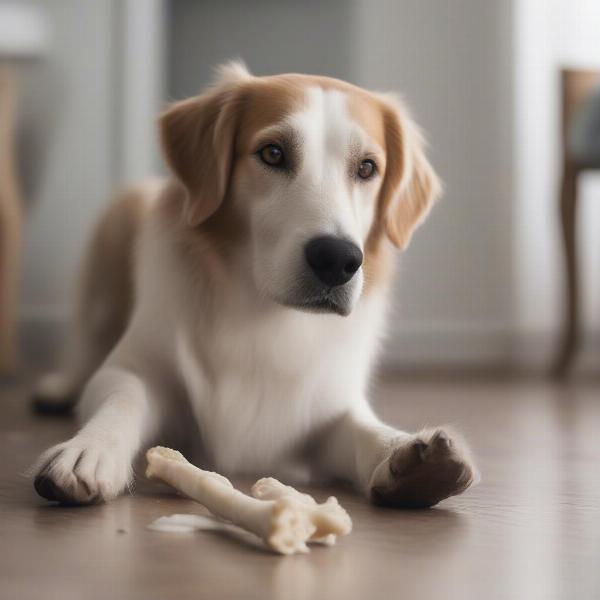Frozen dog bones are a popular treat, especially during hot weather. But are they always a good idea for your furry friend? This article dives into the benefits and risks of giving your dog frozen bones, offering practical advice to ensure your dog enjoys this chilly treat safely. We’ll explore the types of bones suitable for freezing, proper preparation methods, and potential hazards to watch out for.
Benefits of Frozen Dog Bones
Frozen bones can offer several advantages for your canine companion:
- Soothing Relief for Teething Puppies: The cold temperature can help numb sore gums in teething puppies, providing much-needed relief.
- Mental Stimulation and Entertainment: Gnawing on a frozen bone can keep your dog occupied and entertained, reducing boredom and destructive behaviors.
- Dental Health: Chewing on bones can help scrape away plaque and tartar buildup, promoting healthier teeth and gums.
- Cooling Treat on Hot Days: A frozen bone can help your dog cool down on a sweltering summer day.
Choosing the Right Bones for Freezing
Not all bones are created equal when it comes to freezing. Avoid cooked bones entirely, as they become brittle and can splinter, posing a serious choking hazard. Raw bones are generally safer, but choosing the right type is crucial.
- Recreational Bones: Large, meaty beef or bison bones are a good choice. Look for bones that are too large to swallow whole and offer plenty of chewing surface.
- Edible Bones: Smaller, softer bones like chicken wings or necks can be considered for dogs who are experienced bone chewers. Supervise closely and discard any small pieces that break off.
Preparing Frozen Dog Bones
Proper preparation is essential for safe enjoyment. Here’s how to prepare frozen dog bones for your dog:
- Select appropriate raw bones. Avoid cooked bones.
- Wash the bones thoroughly. This helps remove any surface bacteria.
- Place the bones in a freezer-safe bag or container. This prevents freezer burn and keeps the bones clean.
- Freeze for several hours or overnight. Ensure the bones are completely frozen before giving them to your dog.
Potential Hazards of Frozen Dog Bones
While frozen bones can offer benefits, it’s crucial to be aware of potential risks:
- Broken Teeth: Hard, frozen bones can cause teeth to chip or fracture.
- Choking Hazard: Small bone fragments can break off and become lodged in your dog’s throat.
- Digestive Issues: Some dogs may experience constipation or diarrhea after consuming bones.
Are Frozen Bones Right for Your Dog?
Consider your dog’s age, breed, chewing habits, and overall health before offering frozen bones. Puppies and senior dogs with weaker teeth may be better suited to softer chews. dog bones Always supervise your dog when they are enjoying a frozen bone and remove it if it becomes too small or starts to splinter. If you are unsure whether frozen bones are appropriate for your dog, consult with your veterinarian.
 Dog Enjoying a Frozen Bone Safely
Dog Enjoying a Frozen Bone Safely
Conclusion
Frozen dog bones can be a refreshing and enriching treat for your furry friend, but safety should always be the top priority. Choose appropriate raw bones, prepare them correctly, and supervise your dog closely to minimize potential risks. By following these guidelines, you can help ensure your dog enjoys this cool treat safely and happily. Remember to always consult with your veterinarian if you have any concerns about your dog’s diet or dental health. Frozen dog bones can be a valuable addition to a balanced canine lifestyle when offered responsibly.
FAQ
- Can I give my puppy frozen bones? While the cold can soothe teething pain, choose softer bones and supervise closely.
- What type of bones are safe to freeze? Raw, meaty bones like beef or bison are generally safer than cooked bones, which can splinter.
- How long should I let my dog chew on a frozen bone? Supervise your dog and remove the bone when it becomes small enough to swallow.
- What should I do if my dog breaks a tooth on a frozen bone? Contact your veterinarian immediately.
- Can I give my dog frozen marrow bones? Yes, but supervise closely and remove the bone once the marrow is gone. kong dog toys au They can also pose a choking hazard.
- Are frozen bones good for my dog’s teeth? Chewing can help remove plaque and tartar, but hard bones can also cause damage.
- What are some alternatives to frozen bones? turkey treats for dogs or chew toys can be good alternatives.
ILM Dog is a leading online resource for dog owners worldwide, offering expert advice on all aspects of dog care, from breed selection and nutrition to training and health. We provide practical, reliable information to help you nurture your canine companion’s well-being. Whether you’re a new dog owner or a seasoned pro, we’re here to support you every step of the way. From dog silicone molds to titan raw dog food, we strive to provide valuable resources and product information for the best care of your furry friend. Contact us at [email protected] or +44 20-3965-8624. ILM Dog is committed to helping you build a strong, loving bond with your four-legged family member.